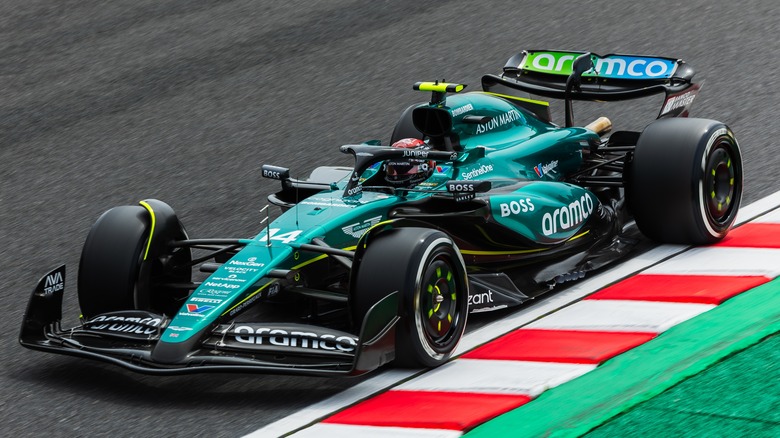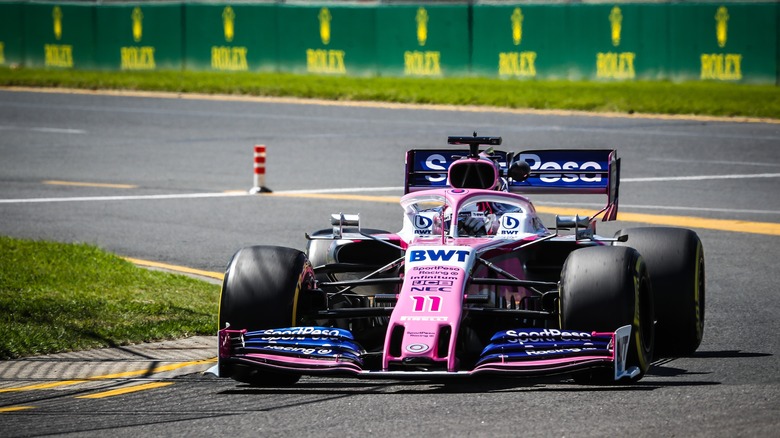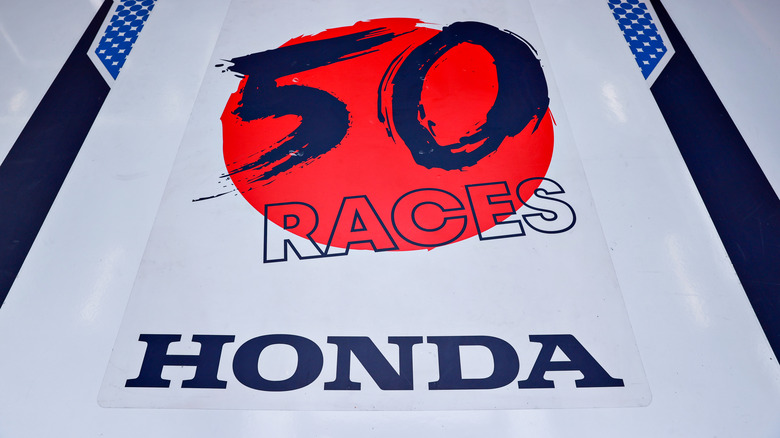Who Makes Aston Martin's F1 Engines? It Won't Be Mercedes Much Longer
The Formula 1 team now known as Aston Martin has changed hands a number of times since the late 2000s, but one thing has remained consistent throughout, its powertrain supplier. Mercedes has provided engines to the Silverstone-based team for 15 years — sustaining the partnership through three different rebrands — making it a strong ally for the end of the V8 engine era of 2006-2013 and the turbo-hybrid era of 2014-present. While the bond between Mercedes and Aston Martin has always been solid, the new engine regulations set to be introduced for the 2026 Formula 1 season have inspired Aston Martin to look at other powertrain partners.
The overhaul for the 2026 season is one of the most extensive in modern history, with an all-new aerodynamic package and a major revision to the powertrain requirements. The new engine regulations outline a major increase in electric power — with a near 50/50 split between internal combustion and electric output — along with a shift to entirely sustainable fuel. The forward-thinking nature of the new regulations has not only inspired some existing teams to make adjustments to current powertrain departments but it has also enticed new engine partners to the sport, including Honda.
Honda has a long and illustrious history in Formula 1, leaving and rejoining a number of times, but it ended its most recent stint as an engine supplier in 2021 after deciding that the current regulations didn't align with its mission toward carbon neutrality by 2050. In light of the new sustainability-focused regulations, Honda announced that it will rejoin the sport in 2026, partnering exclusively with Aston Martin as a full works effort. That means out with Mercedes.
The Aston Martin and Mercedes partnership goes back a long way
While the team initially started out as the Jordan Grand Prix team in 1991 and had brief stints as Midland and Spyker between 2005 and 2008, the team's modern-day history began when controversial Indian businessman Vijay Mallya purchased the team and rebranded it to Force India in 2008, signing Mercedes as its engine supplier in 2009.
After competing as a top midfield contender for years, the Force India team went into administration in 2018 due to financial troubles. The team was kept afloat when Canadian billionaire Lawrence Stroll purchased it, renaming it Racing Point in 2019, and retaining Mercedes power units in the back of the cars. Racing Point's relationship with Mercedes was strong from the outset, even getting the former into a bit of controversy in 2020 with accusations that it had copied aerodynamic elements of the previous year's championship-winning Mercedes. Despite the controversy, Mercedes continued supplying engines, even after Racing Point rebranded to Aston Martin in 2021 following team owner Lawrence Stroll's purchase of a large stake in the British automaker.
As Aston Martin, the team has seen a number of highs and lows with Mercedes engines. However, Aston Martin now sees itself as an established enough team with the resources to transform into a full works outfit going into the next generation of Formula 1 regulations, scheduled to enter the sport in 2026, albeit with some outside assistance from Honda.
Honda's Formula 1 exit and return
Honda is no stranger to Formula 1. In fact, it is one of the most successful engine manufacturers in the sport's history. Most recently, Honda began supplying engines for Red Bull in 2019, helping the team secure the 2021 driver's championship before officially exiting Formula 1 at the end of that year.
Honda's exit from Formula 1 came as a shock to the entire F1 community. The decision boiled down to its racing efforts not aligning closely enough with the goals for its road car program, which aims to be carbon neutral by 2050. At the time of its departure in 2021, Honda told the media that the automotive market was experiencing a "once-in-one-hundred-years period of great transformation" in reference to the rise of new battery and fuel cell technology. Since Formula 1 is a very costly endeavor and it didn't stand to further Honda's road-going technology, its departure was inevitable.
However, with the 2026 shift toward new battery technology and sustainable fuels, Formula 1 once again serves to benefit Honda's on-road efforts. Speaking to the Formula 1 press, Honda CEO Toshihiro Mibe said, "One of the key reasons for our decision to take up the new challenge in F1 is that the world's pinnacle form of racing is striving to become a sustainable racing series, which is in line with the direction Honda is aiming toward carbon neutrality, and it will become a platform which will facilitate the development of our electrification technologies." The trickle-down effect, especially concerning battery technology, is a key reason for Honda's Formula 1 return with Aston Martin in 2026.
Aston Martin will be a full works team in 2026
The Aston Martin team isn't new to Formula 1 anymore, especially considering that the team's time as Racing Point was under the same ownership. The team has proven itself as a worthy addition to the grid and wants to demonstrate its knowledge and experience by fighting at the front. However, it is hard to do that while relying on another team for vital components. Speaking to The Guardian, Aston Martin CEO Martin Whitmarsh said, "The nature of F1 is if you want to win it means beating Mercedes and it is extremely difficult to beat an organization as good as Mercedes if you are reliant on them for intellectual property, facilities, and components." While Aston Martin is a strong outfit, building a Formula 1 engine is no small feat, especially without any prior experience, and that's why help is needed from a successful organization such as Honda.
In order to provide and maintain the new Aston Martin Honda power units, Honda has begun to set up a new powertrain division and factory based in the United Kingdom, to serve as a logistics and engine maintenance hub. The new Honda facility will be located close to Aston Martin's new factory in Silverstone. The Aston Martin Honda team will be one of six engine suppliers for the 2026 F1 rule set alongside Mercedes, Ferrari, Red Bull Ford, Alpine Renault, and Audi. While Honda has replaced Mercedes as the engine partner for the Aston Martin Formula 1 team, the deal will not affect the use of Mercedes engines in Aston Martin road cars.



